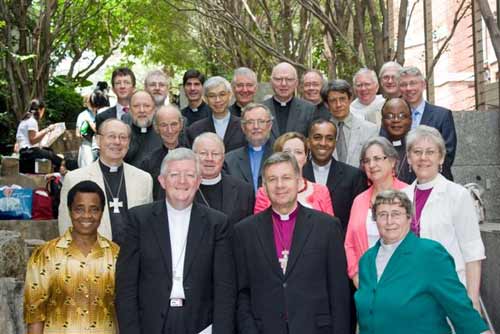The Anglican-Roman Catholic International Commission has completed the second meeting of its new phase (ARCIC III) in Kowloon, Hong Kong (3-10 May 2012).
The Commission, chaired by the Most Revd David Moxon (Anglican Archbishop of the New Zealand Dioceses) and the Most Revd Bernard Longley (Roman Catholic Archbishop of Birmingham) comprises nineteen theologians from a wide range of backgrounds across the world. The Commission is addressing the Church as Communion, local and universal, and how in communion the local and universal Church come to discern right ethical teaching. The Commission is reviewing responses already received in order to prepare some elucidations, together with commentaries, which will enable the material of ARCIC II to be studied at all levels of the churches’ life.
The Commission has developed a “schema” to address the interrelated ecclesiological and ethical questions under four headings: the identity and mission of the Church; the patterning of the Church’s life that undergirds local and universal communion; shortcomings in the churches which obscure the glory of God; and ethical discernment and teaching. Members presented papers in each of these areas which were discussed both in plenary and in small groups.
To assist its own understanding, the Commission is preparing case studies in three ethical areas: matters which historically once seemed settled but which, upon reflection, have come to be viewed quite differently by both traditions.(slavery); issues on which Anglican and Roman Catholic teaching is at variance (divorce and remarriage, contraception); and evolving issues (a theology of work and the economy). It is not intended that the Commission will seek to resolve disputed ethical questions. Rather, its purpose is to analyze the means by which our two traditions have arrived at or are currently determining ‘right ethical teaching’.
The Commission will prepare further papers, expand the case studies, and continue its work in preparation for its next meeting April 29–May 6, 2013.
Source, full text, and list of participants. H/t a correspondent.




I did not realise there is a difference in the way slavery is viewed. Probably not a big difference, but obviously enough to become a case-study. Could someone explain the different views?
ARCIC (established in 1969)was instituted with real enthusiasm. Anglicans and Roman Catholics of that time held great hopes that this formal dialogue between hierarchies would support the ecumenical advances that had been achieved by the folk at ground level.
In 1989 representatives (including me)of the grass roots Church in Britain and Ireland met in Swanick, Derbyshire, England and, moved by a real sense of optimism, produced the statement I have included at the bottom of this comment.
Now, unfortunately, that optimism has been worn away to the point where not only is there little interest in the process but also the flow of information is so restricted that most Anglicans and Roman Catholics are not even aware of it. This ARCIC process, in which we placed such hope, has been put to death by bureaucracy. And the powerful in both Traditions have been happy to watch the execution.
At a recent Anglican synod in the Diocese of Wellington, N.Z., I took a straw poll of around one hundred people, both clergy and lay. I asked them what ARCIC was and what role their Archbishop had to play in it. Only one person answered both questions correctly… and these are people who are interested in their church and included some (archdeacons) who have important responsibilities at diocesan level!
I attach below the web adress to the Swanick declaration to illustrate the wonderful good-will that abounded at that time and has since been allowed to go unharvested. And I pray fervently that those in authority will feel something of the spirit out of which it grew and seek ways to make ARCIC the force for reconciliation that we all hoped it would be.
http://www.churches-together.net/Articles/61676/Churches_Together_in/About_us_Directories/Swanwick_Declaration.aspx
Thanks, Peter, for your comment and links. Sadly I am not shocked by your straw poll – because I should be. I am not shocked because I do not think that ARCIC is the only question that would result in a similarly low percentage. I think we are increasingly accepting a lower and lower level of being informed within the church – in an information age that is what is shocking. Is there also an increasing ghetto mentality, as the church ages and shrinks, of trying to preserve what we do have at the expense of openness and generosity across denominational boundaries? Are we becoming more and more desperately inward looking? Blessings.